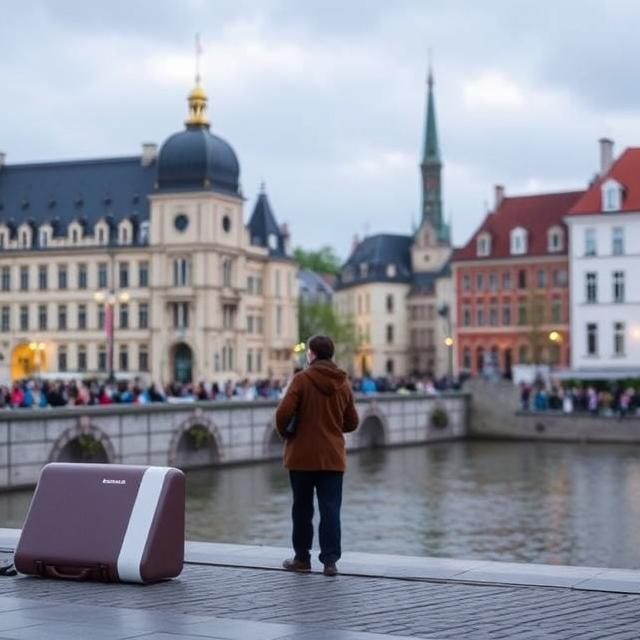Planning a round-the-world (RTW) tour is an exciting and adventurous undertaking, but it can also be overwhelming, especially when it comes to budgeting. A RTW trip allows you to visit multiple countries and continents, experience diverse cultures, and make lifelong memories. However, the costs can quickly add up, which is why careful planning is key to making the most of your budget. Here’s a comprehensive guide on how to plan an affordable RTW tour without compromising on the experiences.
1. Set a Realistic Budget
Before embarking on your RTW journey, it’s essential to set a budget that takes into account all aspects of your trip—flights, accommodation, food, transportation, activities, and unexpected expenses. Establish a daily budget for each destination to help you manage costs effectively. Keep in mind that some countries, particularly in Southeast Asia or Central America, will be much cheaper to travel through than others, like Western Europe or Australia.
- Tips for budget setting:
- Research the average daily costs of the countries you plan to visit.
- Be realistic about the experiences you want (luxury vs. budget travel).
- Factor in extra costs for activities or side trips.
- Allow room for unexpected expenses like emergencies or visa fees.
2. Plan Your Route Efficiently
One of the keys to planning a cost-effective RTW trip is selecting your route wisely. You can minimize the number of flights and the overall cost of transportation by grouping countries or regions geographically. Try to design your route so that you move in a logical direction, rather than backtracking, which can be costly.
- Tips for route planning:
- Fly in one direction (e.g., east or west) to avoid backtracking and reduce the number of flights.
- Stick to regional hubs: Choose popular airports as your entry and exit points, as flights tend to be cheaper to and from major cities.
- Consider overland travel (e.g., buses, trains, or ferries) for certain legs of your journey, which can be cheaper than flights.
3. Take Advantage of RTW Flight Deals
Round-the-world tickets can be more affordable than booking individual flights. Many airlines and alliances offer special RTW fares that allow you to visit multiple destinations for a fixed price, provided you follow a set route. Popular RTW ticket providers include Star Alliance, Oneworld, and SkyTeam.
- Tips for booking RTW flights:
- Compare RTW flight deals from different alliances to find the best value for your planned route.
- Use RTW flight search tools like AirTreks or Flight Centre to compare prices and itineraries.
- Be flexible with your dates and destinations to get the best deals.
- Check for stopover programs where you can stay in cities along your route for little or no extra cost.
4. Travel During Off-Peak Seasons
Traveling during peak seasons (like summer in Europe or the holiday season) can significantly increase your expenses, from flights and accommodation to food and activities. To save money, aim to travel during the off-peak or shoulder seasons, when prices tend to be lower, and crowds are fewer.
- Tips for saving money:
- Research the low season for each region (e.g., traveling in Southeast Asia during the rainy season or visiting Europe in the fall).
- Flights and accommodation tend to be cheaper during off-peak months, and you may also find better deals on activities.
- Be mindful of local holidays and festivals, as prices might increase during these times.
5. Stay in Budget Accommodation
Accommodation can take up a significant portion of your travel budget, but there are many ways to cut costs without sacrificing comfort. Consider staying in budget-friendly accommodations like hostels, guesthouses, Airbnb, or even Couchsurfing.
- Tips for budget accommodation:
- Hostels and guesthouses are great for affordable, social places to stay, often with shared kitchens to save on meals.
- Use accommodation booking platforms like Booking.com, Hostelworld, or Airbnb to find budget options.
- Look for free accommodation options like Couchsurfing, where you stay with locals for free in exchange for cultural exchange.
- Consider booking longer stays at a single accommodation to negotiate a discount.
6. Use Public Transportation
Public transportation is generally cheaper than taxis or ride-sharing services and is widely available in most countries. Research local transportation options such as buses, trains, metros, and ferries to get around without spending much. In some destinations, you can also purchase transport passes that allow unlimited travel for a fixed price.
- Tips for saving on transportation:
- Use public transport for city travel (e.g., buses, metros, trams).
- In regions like Europe, consider Eurail or Interrail passes for unlimited train travel.
- For long-distance travel in countries like India or Southeast Asia, overnight trains or buses can save both on accommodation and travel costs.
- Look for local transport passes or deals in major cities to cut down on transportation costs.
7. Cook Your Own Meals
Dining out in restaurants can quickly eat up your travel budget, especially in popular tourist areas. To save money, try to cook your own meals whenever possible. Many hostels and guesthouses provide kitchen facilities, and local markets are perfect for picking up fresh, affordable ingredients. Street food can also be a cheap and delicious option in many countries.
- Tips for saving on food:
- Stay in places with kitchen facilities and cook your own meals.
- Shop at local markets for fresh produce and regional ingredients.
- Enjoy affordable street food in places like Thailand, Vietnam, and India.
- Avoid eating in tourist hotspots, where prices tend to be higher.
8. Work While You Travel
If you’re open to it, consider earning money while traveling. This can help extend your trip and reduce your overall expenses. There are various ways to work while traveling, such as teaching English, working in hostels, freelance writing, or offering services like photography or social media management.
- Tips for working abroad:
- Look for remote work opportunities in your field.
- Consider teaching English abroad, which is a popular job for travelers, especially in countries like South Korea, Japan, China, or Vietnam.
- Work in exchange for accommodation (e.g., Workaway or WWOOF) to save on lodging expenses.
9. Travel Insurance
While it might seem like an additional expense, travel insurance is an essential part of your RTW trip, providing protection in case of medical emergencies, flight cancellations, lost luggage, or theft. By finding a reliable and affordable insurance policy, you can avoid unexpected costs that could derail your budget.
- Tips for affordable travel insurance:
- Compare policies from different providers to find the best value for coverage.
- Look for policies that offer medical evacuation and coverage for activities you plan to do.
- Consider annual travel insurance if you plan multiple trips during the year, as it might offer a better rate than single-trip coverage.
10. Be Flexible and Open to Last-Minute Deals
Flexibility is one of the most powerful tools when it comes to saving money on your RTW trip. Be open to last-minute deals, especially for flights and accommodations. By adjusting your travel dates or destinations at the last minute, you can take advantage of discounted rates and special promotions.
- Tips for flexibility:
- Use fare comparison websites and apps like Skyscanner or Hopper to monitor fluctuating prices.
- Keep an eye out for flash sales on flights, accommodation, and tours.
- Be willing to change your itinerary if a cheaper opportunity arises, like a new flight deal or affordable accommodation in another nearby city.





